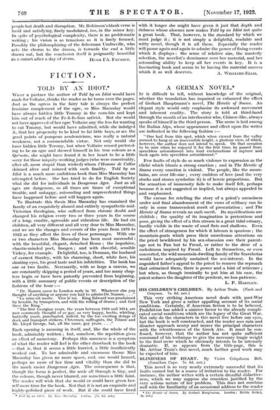FICTION.
TOLD BY AN IDIOT.*
WHAT a partner the author of Told by an Idiot would have made for Voltaire, thinks the reader as he turns over the pages. Just as the ogress in the fairy tale is always the perfect feminine complement of the ogre, so Miss Macaulay would have always hidden little Tommy in the corn-bin and kept him out of reach of the Fe-fi-fo-fum satirist. But she would not have approved of her ogre Voltaire any the less for wanting to eat Tommy, but would have admitted, while she indulged it, that her propensity to be kind to fat little boys, or see the good points of pompous academicians, was really a natural weakness, not a commendable virtue. Not only would she have hidden little Tommy, but when Voltaire ceased pretend- ing to be an ogre and showed himself in his true colours as a Quixote, she might have found it in her heart to be a little sorry for those iniquity-working judges (who were conceivably, after all, more stupid than wicked) whom PHamme de Callas skinned alive and minced with such finality. Told by an Idiot is a much more ambitious book than Miss Macaulay has attempted before. She has tried to do for English Society what she did for individuals in Dangerous Ages. Just as all ages are dangerous, so all times are times of exceptional trouble, and unhappy, astounding and unprecedented things have happened before and will happen again.
To illustrate this thesis Miss Macaulay has examined the family of an exquisitely absurd and entirely sympathetic mid- Victorian theologian, who suffered from chronic doubt and changed his religion every two or three years in the course of a long, erudite, agreeable and ridiculous life. He had six children, all very different and all very dear to Miss Macaulay,
and we see the changes and events of the years from 1879 to 1923 as they affect the lives of these personages. With one or two characters Miss Macaulay has been most successful :
with the beautiful, elegant, detached Rome ; the impulsive, chaotic-minded poet, Imogen ; and with cheerful, sensible Vickey, for example. Delightful, too, is Denman, the husband of earnest Stanley, with his charming, short, white face, his slanting eyes, his good taste and his infidelities. The book has one or two faults. Necessarily, with so large a canvas, we are constantly skipping a period of years, and too many chap- ters begin or have been patently prevented from beginning, with a little summary of public events or description of the fashions of the hour :—
" Dr. Nansen came to London early in '97. Whatever else you thought of anything or anyone you had to admireDr.Nansen. . . ."
"La reine est morte. Vive le roi. King Edward was proclaimed by heralds, by trumpeters, and with the rolling of drums ; and God Save the King."
"The first Georgian years, the years between 1910 and 1914, are now commonly thought of as gay, as very happy, hectic, whirling, butterfly years, punctuated, indeed, by the too exciting doings of dock and transport strikers, Ulstermen, suffragists, the Titanic and Mr. Lloyd George, but, all the same, gay years. . . ."
Each opening is amusing in itself, and, like the whole of the book, admirably written ; but, somehow, the repetition gives an effect of monotony. Perhaps this sameness is a symptom of what the reader will feel is the other drawback to the book —that is, that it seems a little hurried, a little insufficiently worked out. To her admirable and enormous theme Miss Macaulay has given no more space, and; one would hazard, perhaps no more of her time and vitality than she did to the much easier Dangerous Ages. The consequence is that, though the focus is perfect, the scale all through is tiny, and the colours, though never blurred, are sometimes a little faint. The reader will wish that she would or could have given her- self more time for the book. Not that it is not an exquisite and highly-polished piece of work. But if she could have lived • TuAl Inj an Idiot, By Sins:: Macaulay. Collins. [is. ed. net.] with it longer she might have given it just that depth and richness whose absence now makes Told by an Idiot not quite a great book. That, however, is the standard by which we must judge it ; it is not simply a delightful, readable and witty novel, though it is all these. Especially the reader will pause again and again to admire the power of fixing events which it displays : the sense of -relative size, the masterly selection, the novelist's dominance over her material, and her astounding ability to keep all her events in key. It is a fascinating book and seems to be having the material success


























































 Previous page
Previous page